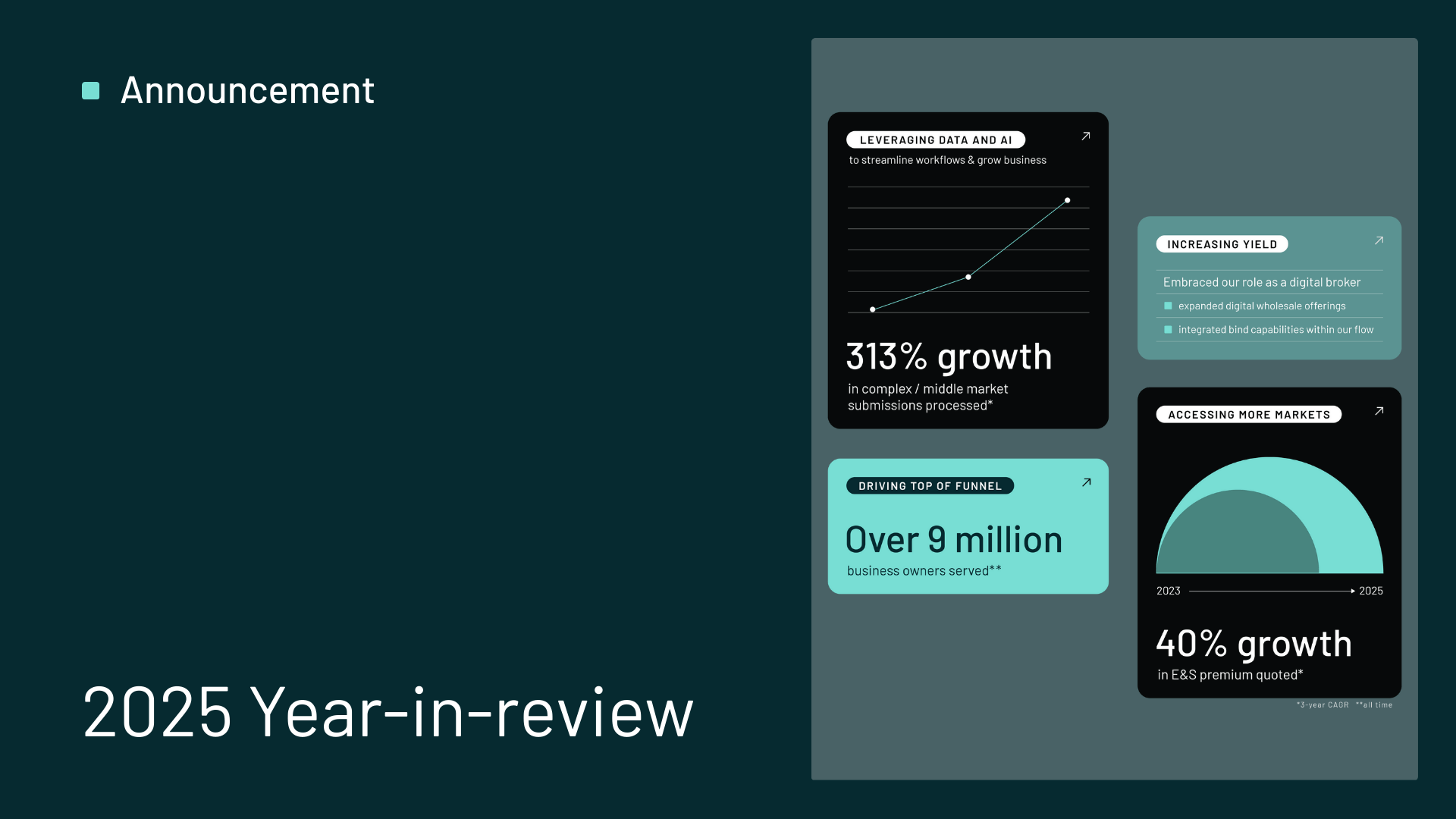Agent-Inspired Insurtechs ‘Self-Disrupt’ Small Commercial Lines
Insurance industry technology is experiencing a revolution.

By Andrea Wells | March 19, 2018
Insurance industry technology is experiencing a revolution. While insurance carriers and venture capital firms have been behind much of today’s insurtech innovation, insurance agents and brokers have also jumped into the fray, seeking to turn insurtech to their advantage even as others seek to deploy new technologies to displace them.
Agents need not fear disruption from insurtechs, or at least not all of them. While there’s a good percentage of startups looking to replace agent distribution, there’s a growing number of insurtechs looking to help the agent distribution channel, too, says Steve Anderson, long-time technology authority for agents. “It’s not quite as unbalanced as some people think it is.”
Ron Berg, Agents Council for Technology (ACT) executive director, agrees, adding that while in the past insurtechs may have been viewed as “disruptors” to the agency model that’s not the case today. “We need to drop the term disrupter because it clouds what is really available for innovation and what we can learn from and use as a distribution channel,” Berg said.
According to Berg, technology is both accelerating and merging to the benefit of agencies. He sees two categories of insurtechs: those trying to take over the independent agency segment and those trying to partner with independent agents, vendors and carriers.
There are so many new insurtech ventures it’s difficult to track and Berg and others predict continued investment in agency-focused insurtechs. “We are absolutely going to see more expansion,” Berg said.
Anderson, agrees, that the opportunities for insurtech platforms focused on the agency distribution system are plentiful — especially those focused on improving the customer experience and increasing operational efficiency. “Those to me are the two areas where I see lots of startups,” he said.
Threats to the agency channel will continue as well because some will always see agents and brokers as an unnecessary middleman. “But, frankly, we’ve heard for 25 years that the agent was dead and there hasn’t been much change,” he said.
However, agents and brokers can’t rest on their laurels, according to the veteran agency consultant, who urges them to adopt an “innovation mindset.”
“I think it’s really difficult for agents and brokers to truly innovate and their mindset is an issue,” he said. He reminds agents that while there is always a risk in action, in doing something, today there is perhaps a “greater risk in not doing something, in inaction.”
Agencies must experiment with insurtech to find the right fit, Anderson says.
First, he advises agents to be aware of what’s “out there.” They should read, look and listen to what’s going in agency technology advancements, Anderson says.
Second, agencies should understand that technology isn’t perfect and some insurtechs won’t work. “They’re going to fail, and that’s a necessary part of the process.”
Third, agents must try and then try again. It’s cheaper today than ever before to try a new technology platform, he said. “You’ve got to be willing to experiment to find the real nuggets that are going to work, and mindset is really key here. The impediment will always be, ‘We’ve never done it that way.’ That’s just not a viable answer to anything anymore.”
Small commercial lines is one area ripe for insurtech innovation and there’s no shortage of players looking to revolutionize this space. Small commercial rating has been a losing proposition for most agents and brokers. According to Anderson there have been many attempts to make small commercial rating more efficient, but the cost of obtaining a policy quote remains high and often unprofitable for agencies.
“Comparative rating in personal lines has streamlined the quoting process (making it more efficient) but we don’t have the same type of process for small commercial,” Anderson said.
Not all insurtechs are out to displace agents.
“If somebody can streamline that process, from both a sales growth (perspective) as well as an operational efficiency perspective, that would be a huge advantage.”
Not all insurtechs are out to displace agents. For every incumbent insurer investing in or partnering with online platforms that bypass agents and brokers, there is at least one committed to agents and the small business market.
In this report, Insurance Journal examined several insurtech options that are looking to help the agency channel in small commercial lines.
Bold Penguin
Bold Penguin, a start-up known for its online marketplace portal for commercial lines property/casualty agents, is also an “exchange” of sorts, says Ilya Bodner, CEO of Bold Penguin.
Bodner has been a tinkerer in the insurance industry for 15 years. He started his career as a captive insurance agent by becoming the principal and opening up two Allstate offices in central Ohio.
“Bold Penguin is an exchange where different agents, agencies, brokers, carriers, MGAs, insurtechs, whatever you call yourself, can come in and trade risks based on their desired appetite,” Bodner said.
“An example would be someone from Arthur J. Gallagher that doesn’t get paid commission on anything that’s less than $10,000 premium, can load in their customer’s application and try to match it with a small retail agent on the corner of Main and High that wants exactly that type of small business, and vice versa.”
The platform provides a variety of segmentations based on business type or size, coverage type, size of coverage, number of employees, date incorporated, past carrier, past coverage; just about anything on an Acord form, Bodner explained.
“We are trying to make it easier for the agents, specifically in commercial insurance, to go from quote to bind faster. That’s our big, hairy, audacious goal,” he said. “There’s nothing in the pre-sales or the marketing side. Nothing in the data management or agency management system or servicing, and nothing post the bind itself.”
Bold Penguin tries to digitize, virtualize, and capture everything, and then automate workflows.
“The exchange helps enable that because when you’re trading risks inside the exchange, all the information’s captured there so there’s no dual data entry. We can hook into agent portals, carrier rates, you name it, to make it a seamless transition,” according to the CEO.
Bodner says Bold Penguin is helping to solve efficiencies by finding certain niches, certain classes, certain business types, where carriers are more technologically flexible to offer the integration. But even he admits there’s more work to be done when it comes to quoting small commercial, or in Bold Penguin’s view, SME’s with 100 or fewer employees.
“I think anyone that tells you they solved it as a start-up is either lying or just completely brainwashed themselves to believing an alternative reality,” he said. “We’re certainly making great strides to solving it, but it still has a long way to go, and the industry itself has a long way to go.”
The biggest challenge for solving the years long dilemma of single entry rating is carrier integration, Bodner said. “The biggest hurdle for us has been, by far, integrating with insurance companies and the first part of the problem was them believing or taking a chance in a startup,” he said. “We struggled with that for the first year of existence, and we’ve overcome that successfully because the exchange took off.”
The challenge is age. “That is the legacy technology that exists in insurance companies,” he said. “Even the CIOs that bought into our concept, even the CEOs that have given us money to go out there and integrate with their insurance companies … Even when that happens, when people buy in, there are still mainframe software and servers that exist inside these insurance companies that are old.” Often, the people who originally wrote that code are either retired or passed away. “The people that are fixing the legacy systems are scared and I can’t blame them.”
Added to that has been the distrust people had in the beginning over insurtechs. “People weren’t sure if we were friends or foe in the beginning. Are we digitizing, are we cutting out the agent, are we virtualizing the process? We’ve been very consistent with our message that we’re here to empower the agent, the trusted advisor, to do his or her job a little faster, simpler, smoother.”
Bold Penguin has options for any size agency, he says. “If you’re a small mom-and-pop shop or a fourth generation agency, we have a login, a web portal, or an app you can go through, and use our technology. If you are an insuretech, we have an API (application programming interface) you can integrate. If you are a giant call center, a giant brokerage, we have business rules and mechanisms you can adopt and pull-in and just set up your own contract. If you are a carrier-owned internal brokerage, we have a way for you to have an enterprise level integration or an account you can set up just by going to our website.”



.png)